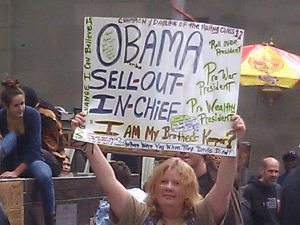
There is no particular political genius to the Occupy Wall Street movement, no soaring, searing vision that sets the world afire in some new and different way. When it comes to political analysis, much of what emanates from the swirl of activity is no more than soggy old left-liberal reformism that only feels more dynamic when wrapped in a youthful, “movement” package. And yet it is the most promising mass U.S. phenomenon in more than forty years. Why, and why now?
The power of the movement derives from the inexorable logic of its animating slogans. It is, at root, opposed to the rule of finance capital – although even the word “capital” is repugnant to some participants who believe themselves to be engaged in a spiritual quest far beyond the parameters of political economy. Nevertheless it is a fact that opposition to the rule of finance capital – to Wall Street – is opposition to capitalism as it actually exists in the here and now. Judging by the ballooning of the movement and the demeanor of its troops, opposition to capitalism as it actually exists turns out to be an exquisitely exhilarating and fulfilling activity, whether those so engaged consider themselves socialists or not.
—-
The movement has had dramatic effect in Black America. By virtue of its whiteness, the OWS has been allowed to exercise citizenship rights that have been effectively denied to African Americans in their militarized communities. A Black-occupied Zuccotti Park, or Freedom Plaza in Washington, DC, or any of the other occupation sites, is unthinkable under the New Jim Crow. It would invite massacre, as virtually every African American knows. White privilege – in this case, the privilege not to be summarily shot or beaten to a pulp en masse when confronting authority – has been on televised display for the past six weeks. Black perceptions of the spectacle were mixed. There was, of course, deep resentment of the ease with which young white kids from “wherever” could flaunt petty public assembly laws and, for the most part, get away with it, while Black youth are routinely accosted, humiliated and falsely imprisoned by police while simply walking or standing in their own neighborhoods. Black activists who have labored for decades in the urban trenches recoiled at the media exposure garnered by even relatively small groups of white OWSers at their downtown encampments.
But, there is another side of the racist coin. The mostly white OWS movement had, in a sense, legitimized civil disobedience and confrontation with the cops in the current era – an opening that could be exploited. And, if the cameras followed the white people like drones on the kill, then Black outfits should take advantage of the new publicity. After all, African American audiences get most of their information from the same corporate media as whites. If white people could take over a city site and proclaim themselves the Occupation, why not “occupy” Black neighborhoods? In a matter of weeks, Occupy the Hoods proliferated, quite often generating more neighborhood organizing activity than had previously existed, and this time with the cameras rolling.
To the extent that it collaborates with people of color within and outside the OWS, the mostly white movement gains legitimacy among those with the greatest (objective) stake in toppling Wall Street. Without such legitimacy, it is doomed, and no amount of white privilege will save it.
It is doubtful that there would have been an Occupy Wall Street phenomenon, as we have experienced it, if President Obama had not lost his last stitch of emperors clothes this past spring and summer. His abject subservience to the “market’s” (Wall Street’s) demands that the budget deficit take priority over human needs – a logic that would necessitate the gutting of virtually every social program of the New Deal and the Great Society, including Social Security – broke the heart of every left-liberal Obamite, and every Black person that was not still drunk on ObamaL’aid. His 2008 activist base watched as Obama pleaded with Republicans to accept his $4 trillion budget cut “Grand Bargain” that would roll back a lifetime of social safety nets. The “progressive’s” champion became the star in their nightmare. This is what their votes had bought them: a total disaster.
And then the OWS folks gave them a movement.
In that sense, we should thank Obama for shattering the illusion that a Black corporate Democrat with better snake oil-selling skills than Bill Clinton can be anything but a more efficient facilitator of Wall Street’s all-consuming, world-killing agenda. However, this unintended favor is nothing compared to the catastrophic harm Obama’s ascent has wreaked on Black politics. The advent of the First Black President has politically neutralized Black America, the most progressive constituency in the nation – despite the fact that Obama opposes every element of the historical Black political consensus on peace and social justice. The opening that OWS has created for movement politics comes not a moment too soon for African Americans, the group most in need of a movement, and with the deepest historical experience in movement-building.
Read More Here.


